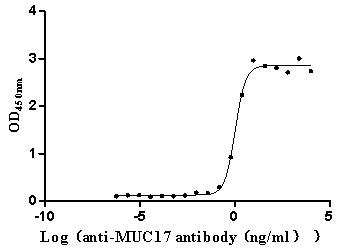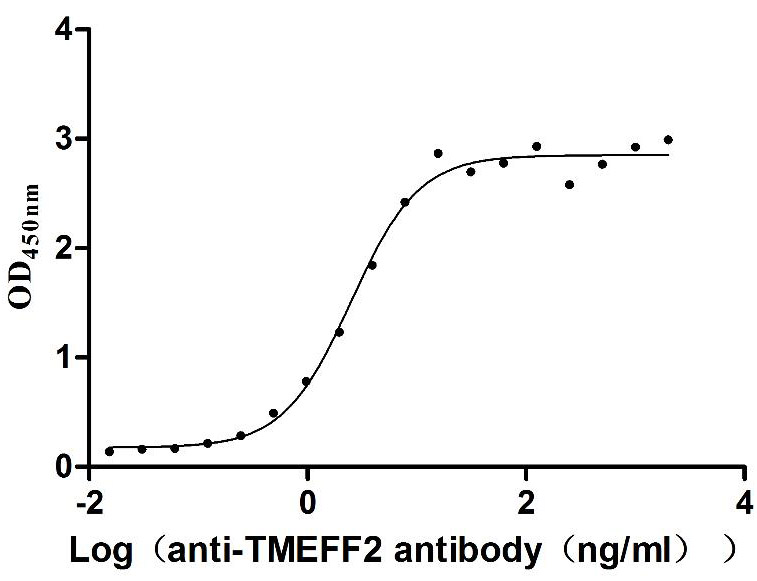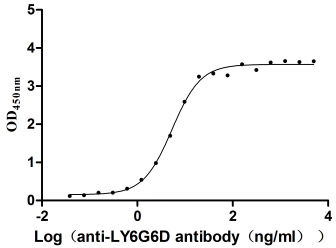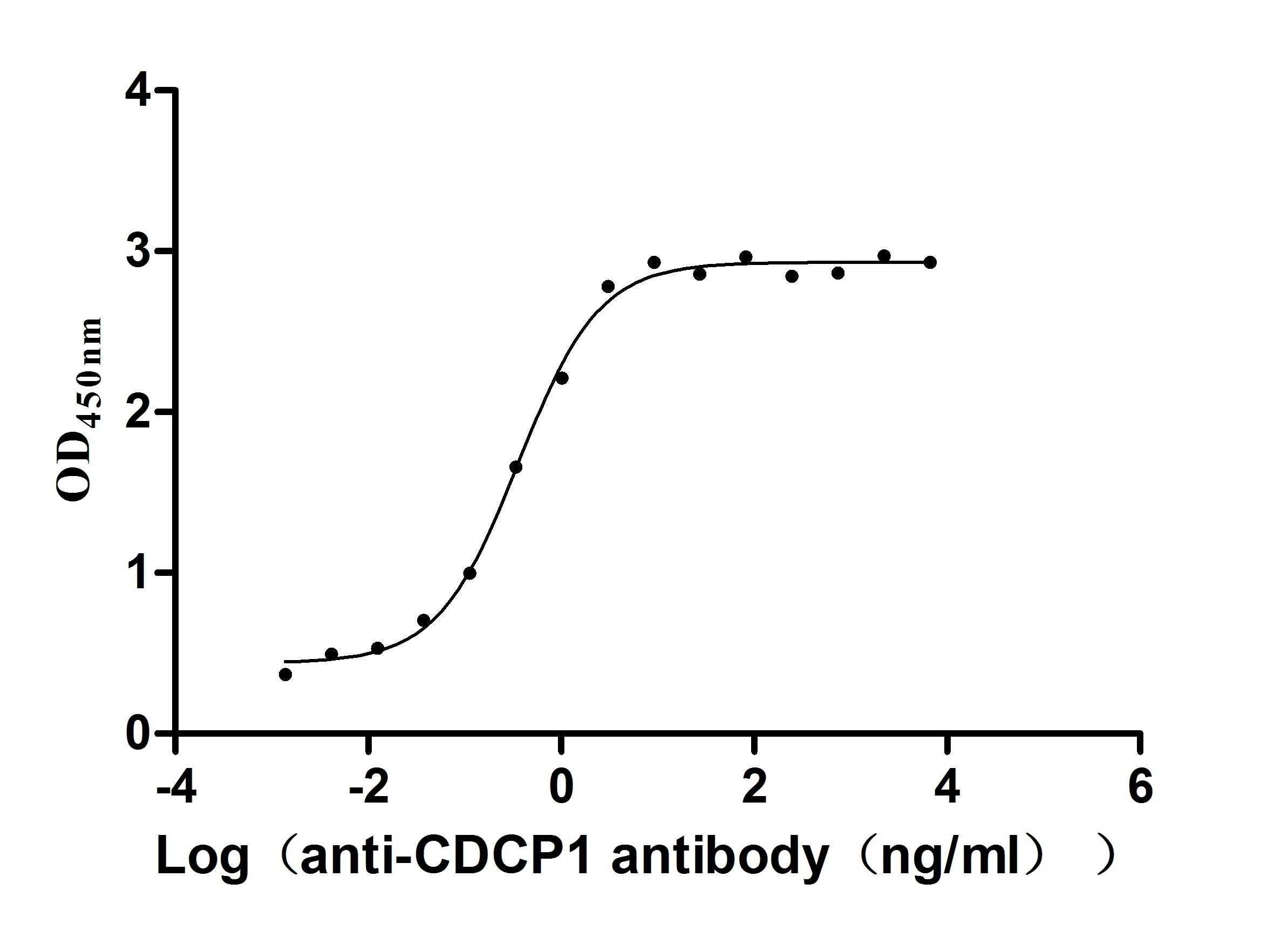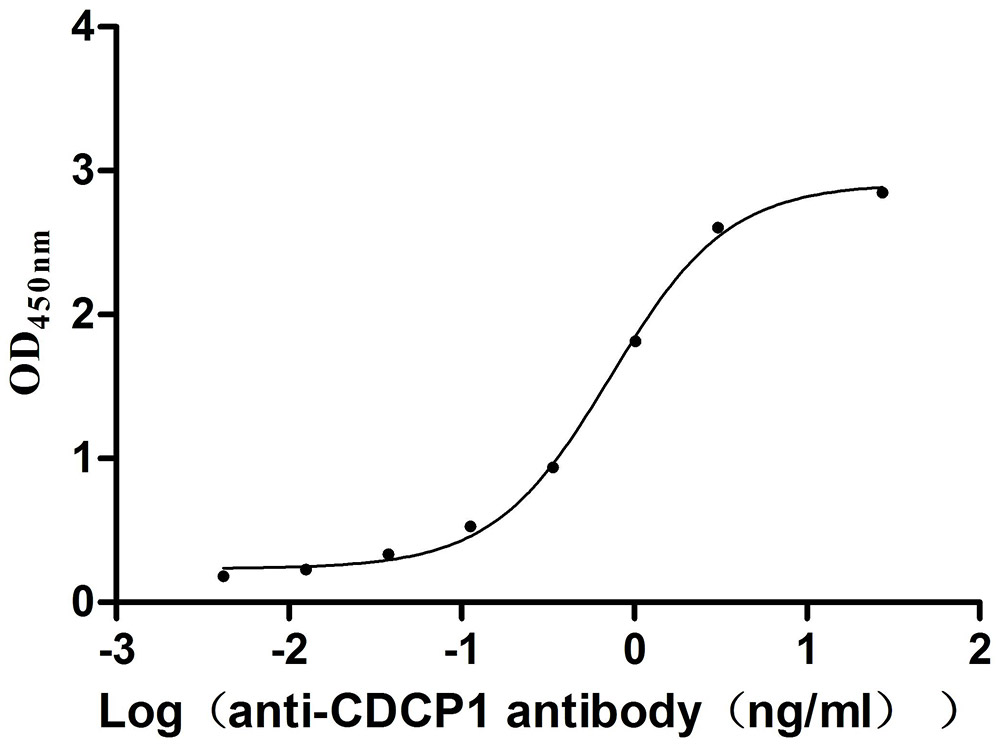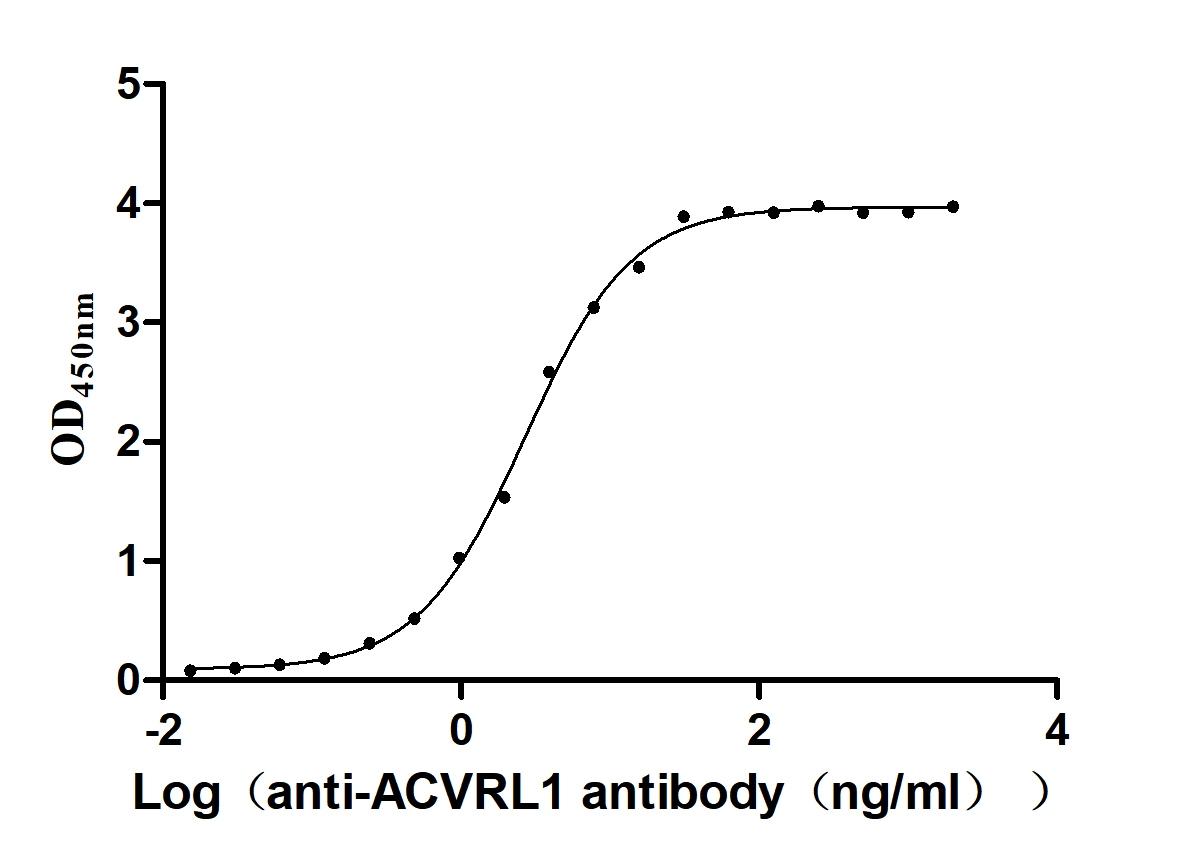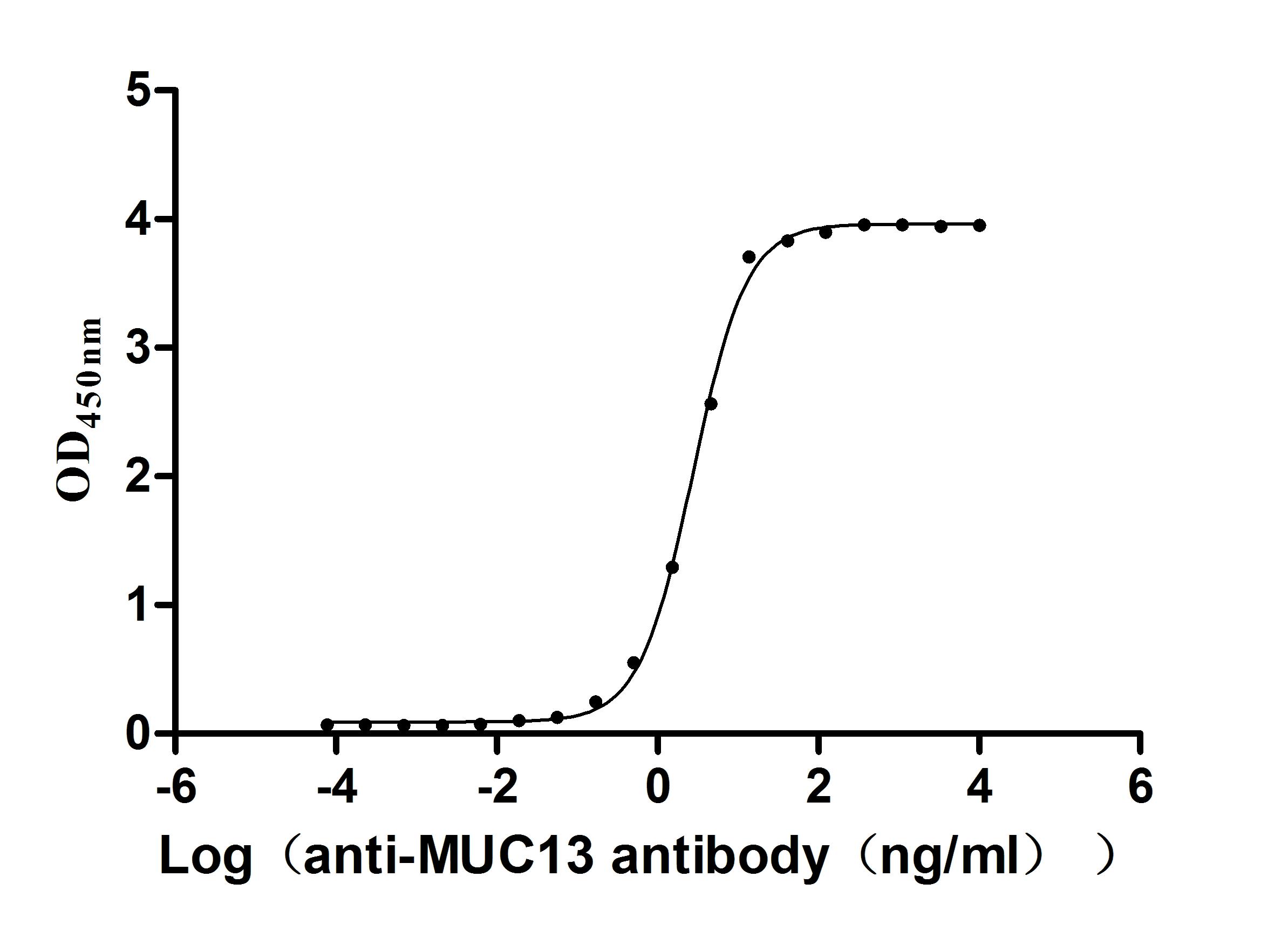Recombinant Mouse Elongation factor 1-alpha 2 (Eef1a2)
-
货号:CSB-YP007412MO
-
规格:
-
来源:Yeast
-
其他:
-
货号:CSB-EP007412MO
-
规格:
-
来源:E.coli
-
其他:
-
货号:CSB-EP007412MO-B
-
规格:
-
来源:E.coli
-
共轭:Avi-tag Biotinylated
E. coli biotin ligase (BirA) is highly specific in covalently attaching biotin to the 15 amino acid AviTag peptide. This recombinant protein was biotinylated in vivo by AviTag-BirA technology, which method is BriA catalyzes amide linkage between the biotin and the specific lysine of the AviTag.
-
其他:
-
货号:CSB-BP007412MO
-
规格:
-
来源:Baculovirus
-
其他:
-
货号:CSB-MP007412MO
-
规格:
-
来源:Mammalian cell
-
其他:
产品详情
-
纯度:>85% (SDS-PAGE)
-
基因名:Eef1a2
-
Uniprot No.:
-
别名:Eef1a2; Eef1al; StnElongation factor 1-alpha 2; EF-1-alpha-2; Eukaryotic elongation factor 1 A-2; eEF1A-2; Statin-S1
-
种属:Mus musculus (Mouse)
-
蛋白长度:Full length protein
-
表达区域:1-463
-
氨基酸序列MGKEKTHINI VVIGHVDSGK STTTGHLIYK CGGIDKRTIE KFEKEAAEMG KGSFKYAWVL DKLKAERERG ITIDISLWKF ETTKYYITII DAPGHRDFIK NMITGTSQAD CAVLIVAAGV GEFEAGISKN GQTREHALLA YTLGVKQLIV GVNKMDSTEP AYSEKRYDEI VKEVSAYIKK IGYNPATVPF VPISGWHGDN MLEPSPNMPW FKGWKVERKE GNASGVSLLE ALDTILPPTR PTDKPLRLPL QDVYKIGGIG TVPVGRVETG ILRPGMVVTF APVNITTEVK SVEMHHEALS EALPGDNVGF NVKNVSVKDI RRGNVCGDSK ADPPQEAAQF TSQVIILNHP GQISAGYSPV IDCHTAHIAC KFAELKEKID RRSGKKLEDN PKSLKSGDAA IVEMVPGKPM CVESFSQYPP LGRFAVRDMR QTVAVGVIKN VEKKSGGAGK VTKSAQKAQK AGK
-
蛋白标签:Tag type will be determined during the manufacturing process.
The tag type will be determined during production process. If you have specified tag type, please tell us and we will develop the specified tag preferentially. -
产品提供形式:Lyophilized powder
Note: We will preferentially ship the format that we have in stock, however, if you have any special requirement for the format, please remark your requirement when placing the order, we will prepare according to your demand. -
复溶:We recommend that this vial be briefly centrifuged prior to opening to bring the contents to the bottom. Please reconstitute protein in deionized sterile water to a concentration of 0.1-1.0 mg/mL.We recommend to add 5-50% of glycerol (final concentration) and aliquot for long-term storage at -20℃/-80℃. Our default final concentration of glycerol is 50%. Customers could use it as reference.
-
储存条件:Store at -20°C/-80°C upon receipt, aliquoting is necessary for mutiple use. Avoid repeated freeze-thaw cycles.
-
保质期:The shelf life is related to many factors, storage state, buffer ingredients, storage temperature and the stability of the protein itself.
Generally, the shelf life of liquid form is 6 months at -20°C/-80°C. The shelf life of lyophilized form is 12 months at -20°C/-80°C. -
货期:Delivery time may differ from different purchasing way or location, please kindly consult your local distributors for specific delivery time.Note: All of our proteins are default shipped with normal blue ice packs, if you request to ship with dry ice, please communicate with us in advance and extra fees will be charged.
-
注意事项:Repeated freezing and thawing is not recommended. Store working aliquots at 4°C for up to one week.
-
Datasheet :Please contact us to get it.
靶点详情
-
功能:This protein promotes the GTP-dependent binding of aminoacyl-tRNA to the A-site of ribosomes during protein biosynthesis.
-
基因功能参考文献:
- The presence of G70S protein was not sufficient to protect mice from neurodegeneration in G70S/- eEF1A2 mice, showing that the mutant protein is essentially non-functional. PMID: 28378778
- This provides the first in vivo confirmation that eEF1A2 plays an important role in translation. PMID: 24460877
- Heterozygous mutant mice showed no deficit in neuromuscular function or signs of spinal cord pathology, in spite of the low levels of eEF1A2 PMID: 22848658
- In-depth analysis using site-directed mutagenesis revealed that PKCbetaI could phosphorylate Ser(3) of the eEF1A2 isoform and that the association between eEF1A2 and PKCbetaI was dependent on the phosphorylation status of eEF1A2 PMID: 20923971
- EEF1A2 may play contribute to the induction or progression of some plasmacytomas and a small percentage of multiple myeloma. PMID: 20505761
- these results suggest an important role for eEF1A2 in driving cap-independent translation of utrophin A in skeletal muscle. PMID: 20053670
- expression of eEF1A-2/S1 protein is activated upon myogenic differentiation PMID: 11724805
- This is a putative oncogene in ovarian cancer. PMID: 12053177
- Data suggest that spontaneous failure of eEF1A2 expression in the wasted mutant first triggers gliosis in spinal cord and retraction of motor nerve terminals in muscle, and then motor neuron pathology and death. PMID: 15835265
- eEF1A-2 interacts with Prdx-I to functionally provide cells with extraordinary resistance to oxidative stress-induced cell death[eEF1A-2 and Prdx-I] PMID: 16888816
- The above findings suggest that an increase in free-form eEF1A under alkaline conditions plays a critical role in alkalinization-induced cell growth. PMID: 19506553
显示更多
收起更多
-
亚细胞定位:Nucleus.
-
蛋白家族:TRAFAC class translation factor GTPase superfamily, Classic translation factor GTPase family, EF-Tu/EF-1A subfamily
-
组织特异性:Found in a wide range of tissues.
-
数据库链接:
KEGG: mmu:13628
STRING: 10090.ENSMUSP00000054556
UniGene: Mm.2645
Most popular with customers
-
Recombinant Human Mucin-17 (MUC17), partial (Active)
Express system: Mammalian cell
Species: Homo sapiens (Human)
-
Recombinant Human Tomoregulin-2 (TMEFF2), partial (Active)
Express system: Mammalian cell
Species: Homo sapiens (Human)
-
Recombinant Macaca fascicularis lymphocyte antigen 6 family member G6D (LY6G6D) (Active)
Express system: Yeast
Species: Macaca fascicularis (Crab-eating macaque) (Cynomolgus monkey)
-
Recombinant Human CUB domain-containing protein 1 (CDCP1), partial (Active)
Express system: Mammalian cell
Species: Homo sapiens (Human)
-
Recombinant Mouse CUB domain-containing protein 1 (Cdcp1), partial (Active)
Express system: Mammalian cell
Species: Mus musculus (Mouse)
-
Recombinant Human Serine/threonine-protein kinase receptor R3 (ACVRL1), partial (Active)
Express system: Baculovirus
Species: Homo sapiens (Human)
-
Recombinant Human Mucin-13(MUC13),partial (Active)
Express system: yeast
Species: Homo sapiens (Human)


